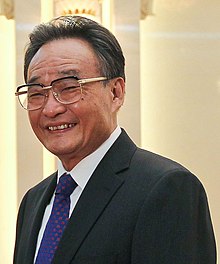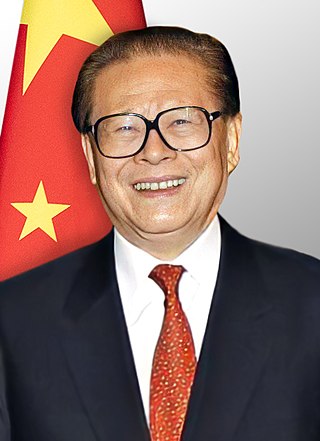
Jiang Zemin was a Chinese politician who served as general secretary of the Chinese Communist Party (CCP) from 1989 to 2002, as chairman of the Central Military Commission from 1989 to 2004, and as president of China from 1993 to 2003. Jiang was the third paramount leader of China from 1989 to 2002. He was the core leader of the third generation of Chinese leadership, one of four core leaders alongside Mao Zedong, Deng Xiaoping, and Xi Jinping.

The Politburo Standing Committee (PSC), officially the Standing Committee of the Political Bureau of the Central Committee of the Communist Party of China, is a committee consisting of the top leadership of the Chinese Communist Party (CCP). Historically it has been composed of five to eleven members, and currently has seven members. Its officially mandated purpose is to conduct policy discussions and make decisions on major issues when the Politburo, a larger decision-making body, is not in session. According to the party's constitution, the General Secretary of the Central Committee must also be a member of the Politburo Standing Committee.
The orders of precedence in China is the ranking of political leaders in China for the purposes of event protocol and to arrange the ordering of names in official news bulletins, both written and televised. It is also sometimes used to assess perceived level of political power. Although there is no formally published ranking, there is usually an established convention and protocol, and the relative positions of Chinese political figures can usually be deduced from the order in meetings and especially by the time and order in which figures are covered by the official media. Since 1982, the General Secretary of the Chinese Communist Party has been the highest-ranking official in the People's Republic of China (PRC).

Zeng Qinghong is a retired Chinese politician. He was a member of the Politburo Standing Committee of the Chinese Communist Party, China's highest leadership council, and First Secretary of the Secretariat of the Central Committee between 2002 and 2007. He also served as the Vice President of China from 2003 to 2008. During the 1990s, Zeng was a close ally of then-Party general secretary Jiang Zemin, and was instrumental in consolidating Jiang's power. For years, Zeng was the primary force behind the party's organization and personnel.

Huang Ju was a Chinese politician and a high-ranking leader in the Chinese Communist Party (CCP). He was one of the nine members of the Politburo Standing Committee of the CCP, China's top decision making body, between 2002 until his death in 2007, and also served as the first-ranked vice premier of China beginning in 2003. He died in office before he could complete his terms on the Standing Committee and as vice premier.
The Shanghai clique, also referred to as the Shanghai gang, Jiang clique, or Jiang faction, refers to an informal group of Chinese Communist Party (CCP) officials who rose to prominence under former CCP General Secretary Jiang Zemin while he served as the party chief and mayor of Shanghai.
Generations of Chinese leadership is a term historians use to characterize distinct periods of the leadership of the Chinese Communist Party (CCP) and, by extension, successive changes in the ideology of the CCP. Historians have studied various periods in the development of the government of the People's Republic of China (PRC) by reference to these "generations".

The 16th National Congress of the Chinese Communist Party was held in Beijing between November 8 and 14, 2002. It was preceded by the 15th National Congress and was succeeded by the 17th National Congress. 2,114 delegates and 40 specially invited delegates represented the party's estimated 66 million members.

Qian Qichen was a Chinese diplomat and politician. He served as Chinese Communist Party (CCP) Politburo member from 1992 to 2002, China's Foreign Minister from April 1988 to March 1998, and as Vice Premier from March 1993 to March 2003. Since then, no other diplomat-turned-politician has attained such a lofty status in China's political hierarchy. Qian played a critical role in shaping China's foreign policy during CCP general secretary Jiang Zemin's administration, and was a key player handling the return to Chinese sovereignty of Hong Kong and Macau. He was in charge of border negotiations with the Soviet Union in the 1980s, resulting in a successful settlement of the border dispute and the thawing of the relations between China and Russia. He was also instrumental in handling China's normalization of relations with the West in the difficult period after the Tiananmen Square protests of 1989.

Han Zheng is a Chinese politician who since 2023 has served as the vice president of China. He previously served as the first-ranking vice premier of China between 2018 and 2023, and as a member of the Politburo Standing Committee of the Chinese Communist Party (CCP) between 2017 and 2022.
The term Tsinghua clique refers to a group of Chinese Communist Party (CCP) politicians that have graduated or have taught at Tsinghua University. They are members of the fourth generation of Chinese leadership, and are purported to hold powerful reformist ideas. Just like their predecessors, they attach great importance to socialism with Chinese characteristics. Their ascendance to power is likely to have begun in 2008 at the CCP's 17th National Congress.
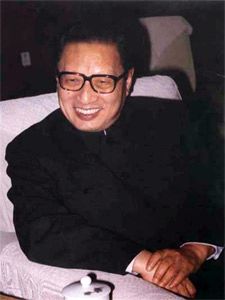
Qiao Shi was a Chinese politician and one of the top leaders of the Chinese Communist Party (CCP). He was a member of the party's top decision-making body, the Politburo Standing Committee, from 1987 to 1997. He was a contender for the paramount leadership of China, but lost out to his political rival Jiang Zemin, who assumed the post of General Secretary of the party in 1989. Qiao Shi instead served as Chairman of the National People's Congress, then the third-ranked political position, from 1993 until his retirement in 1998. Compared with his peers, including Jiang Zemin, Qiao Shi adopted a more liberal stance in political and economic policy, promoting the rule of law and market-oriented reform of state-owned enterprises.
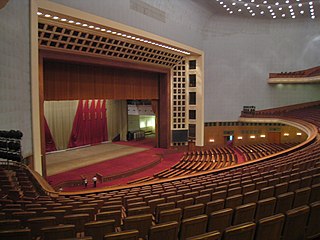
The 17th National Congress of the Chinese Communist Party was held in Beijing, China, at the Great Hall of the People from 15 to 21 October 2007. Congress marked a significant shift in the political direction of the country as CCP General Secretary Hu Jintao solidified his position of leadership. Hu's signature policy doctrine, the Scientific Development Concept, which aimed to create a "Socialist Harmonious Society" through egalitarian wealth distribution and concern for the country's less well-off, was enshrined into the Party Constitution. It was succeeded by the 18th National Congress of the Chinese Communist Party.

Zhang Dejiang is a Chinese retired politician who served as the chairman of the Standing Committee of the National People's Congress between 2013 and 2018. He was also the third-ranking member of the Politburo Standing Committee of the Chinese Communist Party from 2012 to 2017.
The 16th Central Committee of the Chinese Communist Party was in session from 2002 to 2007. It held seven plenary sessions. It was set in motion by the 16th National Congress of the Chinese Communist Party. The 15th Central Committee preceded it. It was followed by the 17th Central Committee of the Chinese Communist Party.
The 15th Central Committee of the Chinese Communist Party was in session from 1997 to 2002. The 14th Central Committee preceded it. It was followed by the 16th Central Committee of the Chinese Communist Party. This was the first Central Committee that current CCP general secretary Xi Jinping was elected to, as an alternative member.
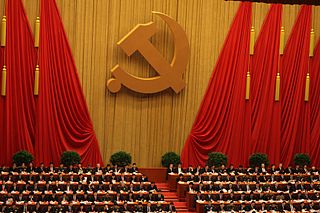
The 18th National Congress of the Chinese Communist Party was held November 8-15, 2012 at the Great Hall of the People. It was preceded by the 17th National Congress of the Chinese Communist Party. Due to term limits and age restrictions, seven of the nine members of the powerful Politburo Standing Committee (PSC) retired during the Congress, including Hu Jintao, who was replaced by Xi Jinping as General Secretary of the Chinese Communist Party. The Congress elected the 18th Central Committee of the Chinese Communist Party, and saw the number of Politburo Standing Committee seats reduced from nine to seven. It was succeeded by the 19th National Congress of the Chinese Communist Party.

Chen Zhili is a retired senior Chinese politician who served as State Councilor and Minister of Education, and a Vice Chairperson of the National People's Congress. She was vice chairman of the organization commission of the 2008 Beijing Olympics.

The chairman of the Standing Committee of the National People's Congress is the presiding officer of the Standing Committee of the National People's Congress (NPCSC), which is the permanent body of the National People's Congress (NPC), the national legislature of China.
Wang Hanbin is a retired Chinese Communist Party politician.
